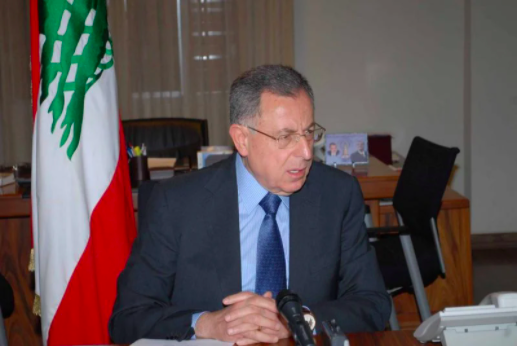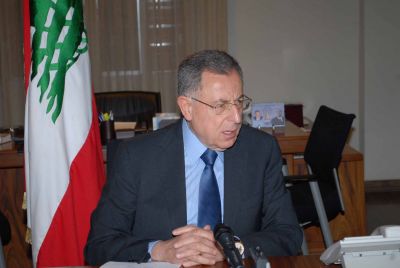
Former Prime Minister Fouad Siniora. (Credit: Ahmad Mantache/Archive)
Since Saad Hariri announced his retirement from Lebanese political life, all eyes have turned to Fouad Siniora, the childhood friend and former right-hand man of late Prime Minister Rafik Hariri, Saad’s father, who was assassinated in February 2005.
Siniora is the man who, back in July 2005, led the first sovereigntist government after the departure of Syrian troops from Lebanon. His cabinet was born from the victory of the March 14 camp, but in which the two Shiite parties, Hezbollah and the Amal Movement, were also represented.
He then became Hezbollah’s antagonist. At the time, the Shiite party accused Siniora of not having supported its fight against Israel during the July 2006 war.
For 18 months, Siniora remained at the head of a government that had lost six Shiite ministers and had to face Hezbollah from its headquarters at the Grand Serail surrounded by barbed wire and concrete blocks, separating the government from the giant camp in the heart of Beirut that was set up by the supporters of the party and its then-recent ally, the Free Patriotic Movement.
Siniora was reappointed as prime minister in the wake of the Doha Agreement in May 2008, which put an end to three years of turbulence bordering on civil war, before he left the Grand Serail in 2009, passing the baton to Saad Hariri.
When Hariri announced his withdrawal from the political scene, Siniora, the former leader of Hariri’s Future Movement parliamentary bloc, let a few days pass before he broke his silence.
At first, he contented himself with a tweet.
“My brother Saad, I stand by your side despite your decision. I am with you, even if they don’t like it,” Siniora wrote on his Twitter account.
His remarks opened the door to several interpretations as to his intentions and vision for the post-Hariri era.
“I wrote ‘despite Saad’s decision’ because I do not really support him in this approach. He should have stayed and continued the journey,” Siniora told L’Orient-Le Jour.
“If he insists on his decision to step aside from political life, this does not, in any way, mean that he should give up. He shouldn’t nor should his supporters,” he added.
Siniora considers himself an integral part of political Harirism, loyal to the legacy of the family, despite some political choices on Saad Hariri’s part, notably the 2016 presidential compromise that saw Michel Aoun ascending to the presidency, and his modus vivendi with Hezbollah.
These differences caused the Sunni leader of Saida to be removed from the Future Movement shortly before the 2018 legislative elections.
But for Siniora, today, the time has come to close ranks.
“The logic of marginalizing the Sunni community in the national equation is unacceptable,” he said.
He added, “The question is not about finding an alternative [to Saad Hariri] or to engage in a new political project, but rather to face any attempt at undermining the Sunni street, which could deviate it from its trajectory.”
This suggests that the former prime minister is ready to do battle with other Sunni competitors as well as with Hezbollah and its allies.
‘Hariri’s place will be preserved’
It was with the aim of “preserving the Sunni constants” that Siniora had endeavored to set up what is called now the “group of former prime ministers,” which includes in addition to Siniora and Hariri, Tammam Salam and current head of government Najib Mikati.
In July 2019, Siniora, Mikati and Salam visited Saudi Arabia and met with King Salman bin Abdulaziz.
According to a well-informed source, the meeting focused at length on the concessions made by Hariri, then prime minister, vis-à-vis the presidential camp and its Shiite ally, Hezbollah.
The source added that the Saudis allegedly asked Siniora to do what was necessary to restore the political balance in the country. Siniora’s response was that he categorically refused to break the agreement with Hariri, stressing his loyalty to the Hariri family.
The Sunni leader reiterated his stance to L’Orient-Le Jour.
“I will not take any decision that would go against Saad Hariri’s interests. I have held all positions in the Lebanese state. I no longer have any political ambition,” he said.
Asked why he had recently reactivated the “group of 20” — bringing together Sunni personalities who, in the past, gravitated within the orbit of both the elder and junior Hariri, and who then moved away, following the presidential compromise — Siniora reasserted that this group had never had any political ambitions in the traditional sense of the term.
The Sunni leader refused to make the slightest connection between the revival of this group’s work with the self-suspension of Hariri’s political activity.
“The goal has always been to support and surround Saad Hariri,” Siniora said, stressing that “the delicate circumstances that the Sunni community is currently going through in Lebanon and in the region require us to avoid any missteps that could cause any schism within it,” Siniora said.
Despite his desire to prevent any division within the Sunni community, Siniora does not hide his disagreement with Hariri’s choice to boycott the upcoming legislative elections.
“In 1992, when the Christians boycotted the elections, they did not achieve their objective. On the contrary, they ended up being sidelined,” Siniora said.
The first elections that were held after the Taif Agreement had been, in fact, shunned by the overwhelming majority of the Christian electorate, who responded to the calls of the leaders of their community that had been frustrated and oppressed under the Syrian occupation.
The vote, which was also boycotted by former Sunni Prime Minister Tammam Salam, had taken place, allowing Christian figures perceived as being close to Damascus to secure seats in Parliament.
“A boycott by the Sunnis, who are deeply rooted in the foundations of the state, would lead them to chaos, and would legitimize this chaos across the country,” Siniora warned.
“The Sunnis have never believed in the logic of militias. Therefore, they must be present to protect the state and preserve their own existence within it,” he added.
It is in this context that Siniora attended, last week, the Friday prayer held by Grand Mufti Abdel-Latif Derian at the al-Omari Grand Mosque in Beirut.
He appeared in public alongside the mufti, the father of the Sunni community, and Mikati, clearly desiring to display Sunni unity and fend off any idea of a refusal to vote that might take hold within the community.
On that day, both Siniora and Mikati announced his decision not to boycott the May legislative elections.
“The coordination between the former prime ministers will continue in order to prepare for the next phase,” Siniora said, adding, “We are going to create a political body which will be responsible for managing political issues, notably the electoral campaign.”
“Saad Hariri’s place will be preserved. His project shall carry on until the day he decides to come back,” Siniora concluded.
This article was originally published in French in L'Orient-Le Jour. Translation by Sahar Ghoussoub
